Suchergebnisse
Summer University Vienna: Green. Building. Solutions.
July 20 - August 11, 2019
Vienna
First-hand ecological knowledge and engineering expertise bundled in a three-week program in the capital of energy-efficient building, Vienna. Think sustainable, take care of your future - now!
World Energy Outlook 2014

Herausgeber: International Energy Agency (IEA), ©OECD/IEA 2014 World Energy Outlook, IEA Publishing
Englisch, 748 Seiten
Net Zero Energy Buildings

International Projects of Carbon Neutrality in Buildings
Voss K., Musall E., et al.
Herausgeber: München 2011 (Internationale IEA Publikation)
Englisch, 40 Seiten
IEA-4E Jahresbericht 2014

IEA Implementing Agreement for a Co-operative Programme on Energy Efficient
End-Use Equipment (4E)
Herausgeber: 4E
Englisch
Downloads zur Publikation
The IEA Bioenergy Annual Report 2006

Of the available biomass conversion technologies for production of more usable energy forms, fast pyrolysis is the least developed, but offers the benefits of a liquid fuel with concomitant advantages of easy storage and transport as well as higher power generation efficiencies than fossil fuelled systems at the smaller scales of operation that are likely to be realised from bioenergy systems.
Englisch
Biobased Industry
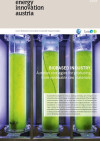
Austrian strategies for producing from renewable raw materials
energy innovation austria
3/2015
Herausgeber: BMVIT and Klima- und Energiefonds
Englisch, 8 Seiten
Downloads zur Publikation
Energy efficiency in industry
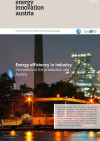
Innovation at the production site Austria
energy innovation austria
3/2013
Herausgeber: BMVIT
Englisch, 8 Seiten
Downloads zur Publikation
IEA AMF - Newsletter 2/2013
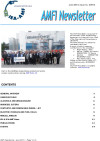
Herausgeber: International Energy Agency - Advanced Motor Fuels
Englisch, 14 Seiten
Downloads zur Publikation
IEA-4E Jahresbericht 2015
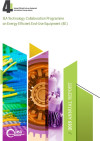
Herausgeber: IEA - 4E
Englisch, 39 Seiten
Downloads zur Publikation
IEA-4E Jahresbericht 2013
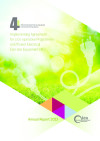
Der Jahresbericht umfasst die wichtigsten Errungenschaften des Jahres 2013, sowie eine Zusammenfassung der Aktivitäten der einzelnen 4E Annexes.
Herausgeber: IEA 4E
Englisch, 46 Seiten
Downloads zur Publikation
The IEA Bioenergy Annual Report 2005

Bioenergy is increasingly utilised to reduce emissions of greenhouse gases (GHG). Various options exist for trading bioenergy and bioenergy services between countries.
Englisch
Eco-Services

Strategies for sustainable development
Forschungsforum
4/1999
Herausgeber: BMVIT
Englisch, 6 Seiten
Downloads zur Publikation
Contracting Platform for SME´s
Evaluation of requirements and framework conditions for the implementation and the operation of a Contracting Platform for SME´s in Austria for the cost efficient identification and realisation of energy efficiency measures.
Conference: Biogas Poland
15. - 16. May 2012
InterContinental Warsaw
Warsaw, PL
Biogas Poland 2012 will explore the opportunities and challenges in the country around the three main types of biogas production.
Green. Building. Solutions.
28. July - 18. August 2013
Vienna, AT
Summer University: First hand ecological knowledge and engineering expertise bundled in a three-week program in the capital of energy efficient building: Vienna. Think sustainable, take care of your future - now.
Excursions "Building of Tomorrow live"
Under the project "Building of tomorrow live" over a year long several excursions to "Building of tomorrow" demonstration projects and other passive houses were organised. Sightseeing opportunities were surveyed, updated several times and published on the web.
Energy Counselling within 60 Minutes
Concept for a high quality, PC supported, 60 minutes energy counselling method, focusing on building refurbishment and new constructions, including a software tested in real counselling situations and a printed documentation.
IEA-SHC Task 66: SOLAR ENERGY BUILDINGS - Integrated solar energy supply concepts for climate-neutral buildings and communities for the "City of the Future”
The energy supply for climate-neutral buildings is based on holistic system concepts that achieve high renewable fractions by intelligently combining technologies, sector coupling, high grid interaction and flexibilization measures. The Solar Energy Buildings Task supports exactly this development. The objective is to identify relevant stakeholders and their needs, to develop a technology portfolio and optimised integrated energy concepts and to give recommendations to policy makers and energy-related companies.
OWA+Quartier - Sustainable refurbishment and energy supply for the historic Otto-Wagner-Areal towards a plus-energy district
Development of thermal and electrical energy supply for the Otto-Wagner-Areal as well as model solutions for construction and building services in order to initiate the redevelopment of the area in the direction of a plus-energy district.
IEA AMT Task 12: Novel 2D materials and laser-based surface processes to increase resource efficiency in mobility applications
Friction and wear cause enormous global costs and CO2 emissions. At the same time, machines should become more and more reliable. Within Task 12, new concepts in material development and surface processes are being examined and advanced in order to reduce friction and wear.
